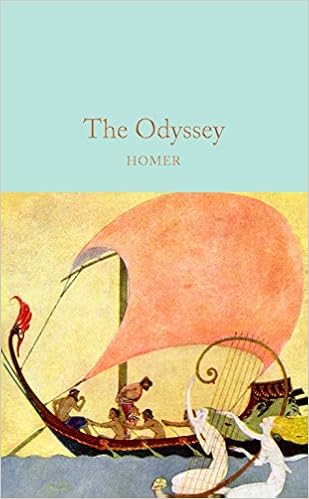
The Odyssey is named after the hero, Odysseus or Ulysses as he was known to the Romans. The book deals with his return journey after the Trojan War from the shores of Troy to his home in the island of Ithaca off the coast of the Greek mainland. After the Trojan war, Odysseus, sacker of cities, leaves for home on his long prowed ships. Favored by Athena, the Goddess of War and Intelligence, the wily Odysseus has been instrumental in winning the war and in pillaging the city of Illium. However, favored as he is, he has incurred the wrath of Poseidon, who is god of the Seas belonging to the Greek divine trinity along with Zeus and Hades. Poseidon wreaks his vengeance on Odysseus by marooning him for seven years on a lonely isle where the demi-goddess Calypso lives. She attempts to seduce him but in vain, as Odysseus weeps for seven years for his home and his wife. At last he is allowed to depart from Calypso's island with his ships but his journey home is fraught with dangers. The sorceress Circe, the Cyclopes, Scylla and Charbydis and not the least, wrathful Poseidon himself strew his path with challenges. Meanwhile in Ithaca, presuming Odysseus to be dead, a hundred suitors have besieged his house and pay court to his wife Queen Penelope who knows she cannot keep turning them down for much longer. The book follows the epic journey and return of Odysseus as he and his faithful son Telemachus attempt to rid themselves of the vile suitors and restore the true king to throne of Ithaca...
Social/Historical context:
It is one of the most famous literary works in the history of the world. So deep has been Homer's impact in the minds of western society that any long and arduous journey is now referred to as an 'Odyssey'. Penelope has gone down in history as an exemplary wife and the poet has contrasted it marvelously by giving the example of Clytaemnstra, the unfaithful, murdering wife of King Agaememmnon. The Homerian epics: the Iliad and the Odyssey have captured the imagination of readers through the centuries in no less vivid a way than the listeners who first heard the epic poem from the Poet himself.
Writing Style:
The book was originally written in hexametric verse - a style common to that time, when all renditions were oral in nature. As a result, there has been much embellishment upon the original works. The Odyssey begins in the middle of the plot, following a broken, semi non-linear plot pattern with details interspersed as flashbacks and reminiscences. Side narratives are included in the story itself in the form of bardic narrations. The translation I read attempted to preserve the original style as closely as possible: eg. 'rosy-fingered dawn' in place of an anglicized 'rose dawn rosy fingered'.
No comments:
Post a Comment